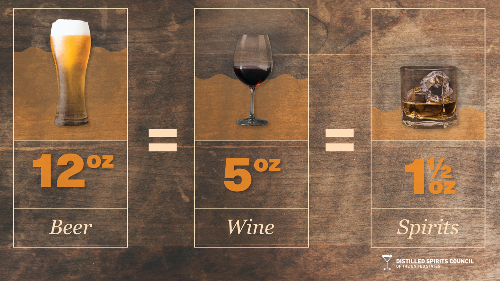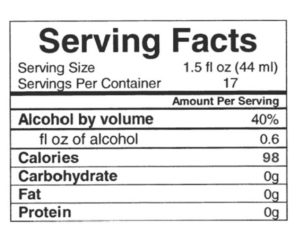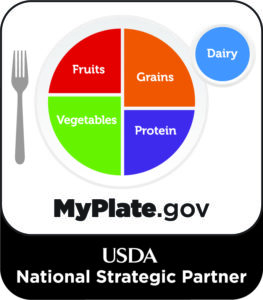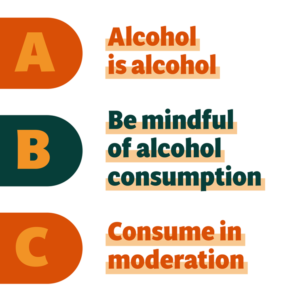Commitment to Moderation & Responsibility
Drinking in Moderation
The USDA 2020-2025 Dietary Guidelines for Americans, which forms the basis of federal nutrition policy and programs, defines moderate drinking as up to one drink per day for women and up to two drinks per day for men.
DISCUS is a MyPlate National Strategic Partner in the USDA Center for Nutrition Policy and Promotion (CNPP) Nutrition Communicators Network.
Standard Drink Equivalence Fact Sheet
StandardDrinks.org & Calculator
As stated by the Dietary Guidelines, a “drink-equivalent” is defined as 1.5 fluid ounces of 80-proof distilled spirits (40 percent alcohol) such as rum, vodka, gin, or whiskey; 12 fluid ounces of regular beer (5 percent alcohol); or 5 fluid ounces of wine (12 percent alcohol). Each drink-equivalent contains the same amount of alcohol, 0.6 fluid ounces of alcohol, and has the same effect on the body. That’s why, when it comes to drinking alcohol, there is no beverage of moderation, only the practice of moderation.

Scientific research has shown that moderate alcohol consumption is associated with a reduced risk of cardiovascular disease and all-cause mortality. However, no one should choose to drink to achieve potential health benefits and even moderate drinking may pose risks for some individuals.
According to the Dietary Guidelines, some individuals should not drink beverage alcohol, including those who are unable to control the amount they drink, individuals under 21 years of age, women who are pregnant or who may become pregnant, individuals taking certain over-the-counter or prescription medications, those with certain medical conditions, and individuals who plan to drive or take part in other activities that require skill, coordination, and alertness.
The Distilled Spirits Council of the United States (DISCUS) recommends that adults who have questions regarding alcohol and health should discuss the potential risks and potential benefits with his/her physician who can determine what is best for that person based on individual risk factors, such as family history, genetics and lifestyle.
DISCUS does not recommend that people drink beverage alcohol for potential health benefits. Alcohol abuse can cause serious health problems.
Serving Facts Labeling Commitment
In 2022, the DISCUS Board of Directors made a commitment to provide Serving Facts information for all spirits products available for sale in the United States.
By June 2024, DISCUS Director Members will provide the following information:
-
- Serving size
- Number of calories per serving size
- Grams of carbohydrates per serving size
- Grams of protein per serving size
- Grams of fat per serving size
The Director Members’ commitment to provide “serving facts” information was announced by DISCUS on Sept. 28, 2022 as part of the Biden administration’s White House Conference on Hunger, Nutrition and Health. DISCUS’ support of the conference and the stakeholder commitment by its Director Members was highlighted and commended by the CDC Foundation.
The “Serving Facts” information will be provided in a TTB approved format and located either on the product label or on a company website with an on-label QR code or website reference. TTB currently provides two approved formats through a serving facts panel or statement of average analysis. This is in addition to all of the other information that has long been required to provide consumers with information about the contents of spirits products, such as alcohol content, defined class and type, and statement of composition (for many products).
This scope of this commitment, however, does not extend to limited-run test products available on-site at production facilities and tasting rooms and will only apply to new labels. Members will be permitted to deplete existing label stock before printing new labels with this information.
While this commitment only applies to the Director Level DISCUS members, many craft members are also eager to provide this information but may lack the same resources and in-house expertise. Accordingly, the DISCUS Technical Committee will provide educational webinars on how to most easily calculate this information and has developed a calculator available to all members to assist in this process.
Many DISCUS members have made individual commitments to provide this information over the years and DISCUS is pleased to bring together a commitment of the larger distilling community.
Example of a New Spirits Label



